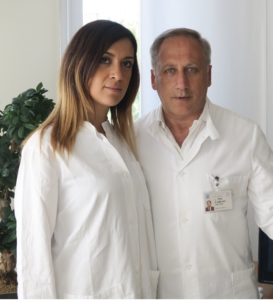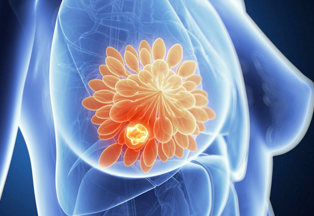
Co-authors Associate Professor Francesca Caccuri, PhD and Professor Arnaldo Caruso of University of Brescia, Italy.
Triple-negative breast cancer is a highly aggressive cancer with poor prognosis. Italian investigators have shown that U94, the latency gene of HHV-6, interferes with the metastatic cascade by inhibiting DNA damage repair genes and cell cycle, leading to intrinsic apoptotic cell death. Apoptosis in breast cancer cell lines exposed to HHV-6 u94 was significantly higher than those of Non-Treated cells. U94 altered the expression levels of several proteins involved in intrinsic apoptosis such as Bcl-2, Bad, caspase-3, caspase-9, and PARP.
Importantly, U94 doesn’t just act as an anticancer agent on its own but can work synergistically with other therapies to improve outcomes in cancer treatment. The group, led by Francesca Caccuri and Arnaldo Caruso of University of Brescia, tested whether U94’s inhibition of DNA repair machinery increased the effectiveness of DNA-damaging chemotherapeutic drugs by exposing cells to Cisplatin and Doxorubicin (both DNA-damaging drugs) as well as Taxol (a microtubule inhibitor used as a control). Their results showed that U94 had the ability to sensitize cancer cells to DNA-damaging chemotherapy and exponentially increase their impact.
 The group’s microarray data also highlighted the ability of U94 to block the cholesterol biosynthesis pathway, which is also a recognized target for cancer therapy, and in the view of the authors, deserves further investigation. The team notes that the ability of U94 to interfere with cancer cell proliferation and, at the same time, to promote apoptosis suggests that the viral protein can act as a cancer cell killer in two ways – by blocking DNA repair and by inhibiting cholesterol synthesis.
The group’s microarray data also highlighted the ability of U94 to block the cholesterol biosynthesis pathway, which is also a recognized target for cancer therapy, and in the view of the authors, deserves further investigation. The team notes that the ability of U94 to interfere with cancer cell proliferation and, at the same time, to promote apoptosis suggests that the viral protein can act as a cancer cell killer in two ways – by blocking DNA repair and by inhibiting cholesterol synthesis.
 The University of Brescia team previously published data demonstrating that U94 can inhibit angiogenetic properties in endothelial cells. They conclude that U94 shows promise as a potential breast cancer treatment either alone or in combination with other treatments.
The University of Brescia team previously published data demonstrating that U94 can inhibit angiogenetic properties in endothelial cells. They conclude that U94 shows promise as a potential breast cancer treatment either alone or in combination with other treatments.
We asked Francesca Caccuri and lab director Professor Aarnold Caruso about their next plans. First they wplan to optimize the U94 activity by dissecting the viral protein to identify the active portion, with an eye toward optimizing an "anti-cancer effect". Second, they will scrutinized the role of cholesterol and the ability of U94 to inhibit the cholesterol biosynthesis pathway. They note that since cholesterol is known to influence oncogenesis, this effort might uncover another means by which U94 could be developed for cancer therapy.
Read the full paper: Caccuri 2019

